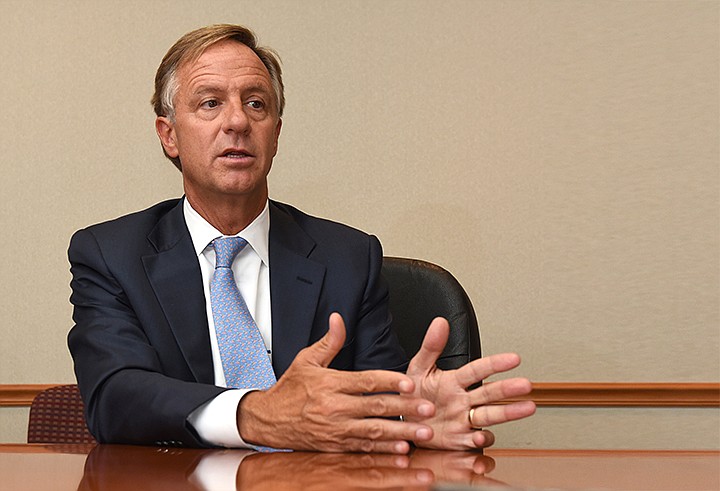NASHVILLE -- Despite a pending U.S. Supreme Court ruling on whether taxpayer-subsidies for people on federally operated health insurance exchanges are legal, Gov. Bill Haslam said today he sees little reason right now in preparing for the possibility that 155,000 Tennesseans could soon be left floundering.
"I think we're at the point of where we'll wait," the Republican told reporters earlier today. "I mean, the King v. Burwell decision obviously has to happen in the next 14 days. So I think we're at the point right now of waiting and seeing.
"Let's see what happens there," the Republican added. "As I said, building that state exchange won't be easy or cheap or quick. And so there'd be a lot to take into case there. I think rather than spend a lot of time and motion on it now, let's wait and see what the Supreme Court says."
If the court indeed rules the federal subsidies for lower-income families and individuals in states that don't operate their own exchanges aren't legal, Haslam said, the question becomes "do they provide some remedy" or "does Congress address it in some way as well."
At this juncture, the governor probably can't do anything anyhow. Setting up a highly sophisticated state-run web-based health insurance marketplace to enroll individuals and families and connect them with federal subsidies based on income would take months or, more likely, a year or so.
Reuters news service reported that the Obama administration on Monday approved plans by Arkansas, Delaware and Pennsylvania to create their own exchanges.
They, along with Tennessee, Georgia and Alabama, are among 37 states that depend entirely or in part on the federal HealthCare.gov website for their residents' needs.
If the court indeed rules the federal subsidies for lower-income families and individuals on federally operated exchanges are illegal, Haslam said, the question becomes "do they provide some remedy and then does Congress address it in some way as well."
Haslam in late 2012 rejected the idea of the state running its own exchange, then decided in early 2013 not to go into partnership with the federal government on an exchange.
Also in 2013, the governor chose not to expand Medicaid to an estimated 280,000 under another provision of the Affordable Care Act. But when he announced the Medicaid decision, he also said he would negotiate for a more market-driven plan with federal officials.
He received tentative federal approval for that last December, only to see his proposed Insure Plan die twice in the state Senate this year.
A number of states opted not to go with their own exchanges because of timelines and technological difficulties in setting up the complex web-based marketplaces.
Tennessee has experienced considerable headaches over its inability to get a new system up and running for TennCare, the state's version of Medicaid, that can interact with the federal exchange.
The state last year wound up giving the boot to its contractor and starting again from scratch.
